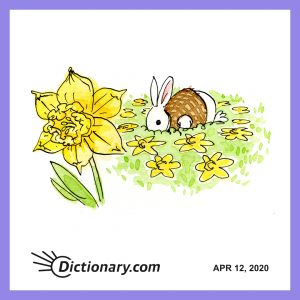Word of the Day
daffadowndilly
noun
Chiefly British Dialect.
a daffodil.
More about daffadowndilly
Daffodil has given rise to many, many playful, fanciful variations: daffadowndilly, daffadoondilly, daffadilly, daffodilly, daffydowndilly. The Middle English word is affodil (also affadil and affedil) “asphodel,” the name of several plants, including the daffodil. Affodil comes from French affadille and Medieval Latin affodillus (also asfodillus), from Latin asphodelus, from Greek asphódelos “asphodel.” Spellings with and without initial d– have always existed side-by-side in English, but the initial d– in daffadowndilly (and daffodil) has never been satisfactorily explained. Daffadowndilly entered English in the 16th century.

how is daffadowndilly used?
With your kirtle of green and your gay yellow gown, Daffadowndilly.
Growing in the vale / By the uplands hilly, / Growing straight and frail, / Lady Daffadowndilly.
daffadowndilly


cosset
verb (used with object)
to treat as a pet; pamper; coddle.
More about cosset
The verb cosset “to treat as a pet, pamper, coddle” is a derivative verb use of the noun cosset “a lamb raised as a pet.” The noun cosset has no certain etymology, but it has been suggested that it comes from Middle English cot-sēte “cottage dweller, cottager,” from Old English cot-sǣta. Cot-sēte, a rare enough word, is last recorded about 1400. Modern cosset (in the sense “pet lamb”) first appears in English in The Shepheardes Calender (1579) by Edmund Spenser, who uses words and spellings that were already archaic in his time.
how is cosset used?
It occurred to me, as I took my bag over, that it might be airline policy to comfort those who were going home for reasons such as mine with an upgrade, to cosset them through the night with quiet sympathy and an extra blanket or something.
We cosset and succor its every sniffle with enormous devotion, even as we more or less ignore the increasingly urgent fever that the globe is now running.
cosset


hero
noun
a person noted for courageous acts or nobility of character.
Why we chose hero
Heroes are everywhere right now, and we’re teaming up with Rocket Mortgage by Quicken Loans to say thank you. Share your message of gratitude with #EveryoneKnowsAHero and @RocketMortgage. Watch below to learn more.
More about hero
The English singular noun hero is formed from the plural heroes, which comes from Latin hērōes, the plural of hērōs “(mythical) hero.” Hērōs comes from Greek hḗrōs (plural hḗrōes) “hero,” a very ancient word that meant many things to the Greeks. A compound noun trisērohei, literally “Thrice Hero,” possibly the name of a deity “Clan Ancestor (?),” appears on a Linear B tablet from Pylos, dating to the 13th century b.c. In the Iliad, hḗrōs means “warrior,” and often little more than “man,” and not a semidivine being. In later Greek, hḗrōs was a semidivine being with his own cult, usually local, the only exception being Hercules (Heracles). (Greek Hērākléēs, also spelled Hērāklês, means “Glory of Hera.” Hḗrā is the Greek feminine form of hḗrōs; she is a daughter of Cronus and sister and wife of Zeus. Her name occurs next to the name of Zeus on the same Mycenaean Greek text, which makes likely the assumption that Hera was already honored as the consort of Zeus.) Unfortunately, hḗrōs and its derivative noun Hḗrā, like 60 percent of Greek vocabulary, have no satisfactory etymology. The various etymologies proposed suffer from various degrees of improbability. Hero entered English in the 16th century.
how is hero used?
Amid all the bleak news about the coronavirus pandemic, it’s important to remember that there are so many heroes in America right now.
Every crisis has its heroes, every disaster its displays of selflessness and sacrifice. … And now, amid the coronavirus pandemic, our health-care workers, doctors, nurses, EMTs and support staff who risk becoming infected themselves—who risk infecting their own families—are making extraordinary sacrifices to care for the rest of us.
hero





